Nerine Dorman's Blog, page 15
June 14, 2022
Mass Effect Andromeda: Annihilation by Catherynne M Valente
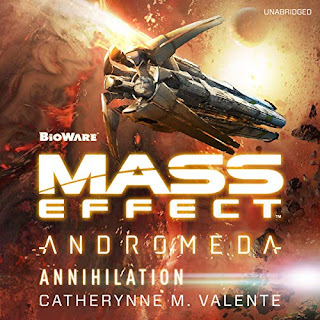
I will admit that Mass Effect Andromeda was my starting point with the ME games, which is possibly not the best place to dig into the franchise, but there we have it. And while MEA didn't hit me with a cosmic 2x4 the way Dragon Age Inquisition did, I still enjoyed the game, glitchy as it was. As a noob to the ME world, I will also admit that I didn't have an established context for half the details taken for granted by others.
There's a lot of potential for content in the ME games, and I vaguely recall that the two books that tie in with MEA were meant to supplement the main storyline – and in Annihilation by Catherynne M Valente, we discover the fate of the Quarian Ark, the Keelah Si'yah.
The plot is very much a case of 'let's make a list of anything that can and will go wrong on a space-faring vessel' ... and then some. And considering when the novel came out, it was, ahem, oddly prescient in investigating how people deal with a pandemic. Part 'whodunnit', part MacGuyver-style quest, our desperate team must battle against the spread of a deadly disease and lack of resources, all while a metaphorical clock is counting down. No one ever said colonisation was easy, and if you're 600 light years out from your home world, there are no do-overs. You must make do, instead.
This was my introduction to most of the races that I didn't get to meet in the game, and I particularly loved the elcor doctor Yorrik with a penchant for Shakespeare. I will also admit that I struggled to tell my drells apart from my voluses, so if you've not played any of the games, you may want to visit the Wiki before plunging into Annihilation.
This was, to my knowledge, the first Catherynne M Valente book that I've read – and she's been on my radar awhile now, and I reckon she does a good job with this story. It's a bit slow-moving, I suspect, for some tastes, but I enjoyed the gradual unfolding and ramping up of tension. And ick, the pandemic theme was a little too close to the bone for me. Tom Taylorson does a bang-up job narrating, and I have no complaints there.
While this hasn't been the greatest hit I'm going to crow about in reviews, this was still an enjoyable read for someone who's wanting a better frame of reference for the ME universe. Alas, poor Yorrik.
June 5, 2022
Starless by Jacqueline Carey
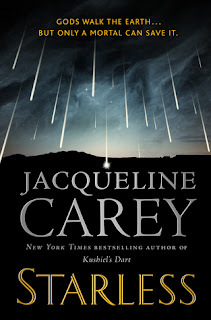
We meet Khai, who's a warrior-monk training in a desert fastness, destined to be the shadow (guardian) of one of the Sun-blessed in a royal family. So, that's the premise we start with, and Carey spends much time in the desert building up Khai's unique situation and allowing us to get to know him. I really got stuck into the story at that point. Then, Khai is taken to meet his charge, and the story kinda starts to fall flat for me.
I get the whole "these two are destined to be close because of the Prophecy" kind of relationship that is akin to an 'insta-love' zing across the room, but the ease with which Khai and Zariya kindle their close partnership felt a little too effortless for me. The concept of the novel, too, while interesting and well realised – with the gods walking among mortals, feels a bit too epic in the sense that I actually struggled to suspend disbelief (!!!). Yeah, yeah, I know what you're thinking. This not-so-gentle reader who happily accepts dragons and inter-dimensional portals stumbling over larger-than-life deities and the relentless pursuit of nasty world-ending critters.
There's a point later where the story performs a sharp, ninety-degree turn into a completely different direction that threw me off, too. Stuff happens, and the affected parties were so calm, once again taking the shift in their fortunes so calmly, it didn't quite ring true. If you lose out on a deal that cost you a lot in terms of your wealth and time, you're not going to be calm about it and wish all parties well, merrily on their way, is all I'm saying.
I feel the main problem with this novel is pacing. We spend a good chunk setting up Khai as a character at the Fortress of the Winds, then arrive in the capital Merabaht, where we are plunged into an Islamic Golden Age-type intrigue. All this comes across as set-up, with Khai turning into a bit of a lovestruck loon that feels almost at odds with his character at the start. Then about halfway through, what initially felt as if it was going to be a novel chock full of courtly intrigue, we are suddenly flung into a sea-roving quest with a completely new cast of characters we simply don't have enough time to get to know enough to care about.
Or, rather, the support cast was intriguing, and I'd wanted to know more.
In terms of the general theme of a world without stars at night, and gods incarnated in the flesh, I kinda called the ending and what would happen. And all I'll say is I was not surprised. There was something quite Frodo-esque about how things were resolved, and from there the story sort of just ends on what I feel is a wee bit of a damp squib. I get the idea that Carey had a fantastic concept for this story but then didn't quite develop it to its full potential. This could have been a trilogy, but instead we had everything squished into one novel that almost felt like a ttRPG in terms of the way the action plays out. Not that this is a bad thing, but it felt rushed halfway through, as if she wasn't quite sure where she wanted to take the story. So we go from intricate detail to rushed, broad strokes – and this felt jarring to me.
My overall verdict is that this could have been so much better. Did I enjoy it? Yes. Was there stuff about Starless that annoyed me? Yes. Carey remains on my list of favourites, but this is not her strongest work.
May 23, 2022
Bury My Heart at Wounded Knee by Dee Brown
There are no two ways about it: the effects of colonialism are devastating for those who find themselves on the wrong side of the settlers' guns. I'd heard much of Dee Brown's Bury My Heart at Wounded Knee, so when the title turned up in my Audible subscription, I gave it a listen. And I'm so glad I did. The book really put a lot into perspective in terms of an American history that I had, up until now, only gleaned snippets of. An American history that is not often discussed or mentioned in mainstream media, that I feel is often conveniently brushed under the rug.
How often we've heard that saying that history is written by the victors. Well, this history is written by those who were vanquished, and if you have the wherewithal to endure chapter after chapter of tragedy, then this is possibly one of the most important books you can invest your time in. And this is a hard read.
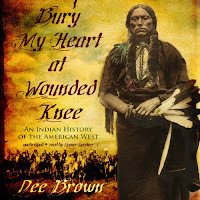
I came to this book from the perspective of a post-colonial South African, who has lived through some pretty, ahem, shall I say it – *exciting* – events in African history. So, it was a fascinating dive to try to draw parallels between what happened in Africa vs. the Americas. It's all connected, and it's nearly all awful. I can't even begin to untangle things. And, perhaps with history, it's pointless dwelling on that which you can't change, that lies in the past.
But you can certainly lean on what you've learnt about the past so that you can ensure that you are a better person than your forebears. At least that is the way I look at things. Specifically to view those who are different from me through a lens that focuses on the commonalities. We all love, hope, bleed, dream, desire for a better future. To think that in the past (and perhaps even now) there are people out there who believe that those who are different from them are not even worthy of respect and dignity. That is staggering.
Brown gives a thorough history of all the broken treaties, the lies, the malice, the callousness of those who wielded power over those who had less. Those First Nations who just wanted to live in peace, until their younger men, too, were caught up in the death spiral of violence and retribution. I guess what they say about hindsight is all too true, but for those caught in the thick of the conflict it was impossible to see a way out that didn't result in further bloodshed. The staggering arrogance of those who took land, who saw it as a divine mandate in the name of their religion and nationalism. It's just disgusting.
Brown writes with great sympathy for the First Nations people who suffered, detailing the conflicts that destroyed entire tribes in a way that makes me ashamed to think of what my direct ancestors did here in Africa. If anything, this harrowing book is a massive cautionary tale warning us that we can be better, *do* better to set aside these artificial notions that one race is somehow better than another thanks to the colour of their skin or the religion that they adhere to.
While I was close to tears several times throughout the reading, I persevered. So many doomed heroes stand out, and it is my fervent hope that more people read this book – it is an important document that deserves to be foregrounded for future generations.
May 19, 2022
Thief Mage Beggar Mage by Cat Hellisen
I've edited or seen early drafts of many of Cat Hellisen's novels and short stories, so it was an absolute treat to have a first look at one of their titles that I've *not* worked on, and it is one that I could simply concentrate on reading and enjoying. Thief Mage Beggar Mage is best described as a heady mix of magic, kinda-Asian-inspired fantasy, courtly shenanigans, betrayal, untenable love, and dragons. What's not to love? Okay, so I admit it, this book ticked all the boxes for me right from the start.
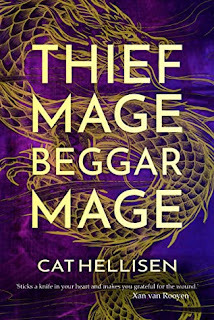
We follow the doings of Tet, who's crippled by a curse from the gods unless he can retrieve a magical artefact. In a world where your true name can be the deadliest currency, Tet's problem (apart from the dastardly divine curse that just gets worse by the day) is the fact that he doesn't know his true name. And as the story unfolds, Tet's quest becomes more and more complicated as he crosses paths with the mysterious Dohza, who is beguiling and enshrouded in mystery. Tet knows better than to fall for the one-armed mage, but as we get to know him, we realise that Tet is not exactly known for his good life choices. Especially when those life choices have him entangled in a plot to unseat The White Prince – a despot who rules the empire with an iron fist.
I admit I'm a sucker for stories about the underdog who has lost everything, and somehow has to claw his way back out of the deep hole which, let's be honest, he dug for himself, and Tet fits that mould perfectly for me. He's pitiable, yet has a peculiar kind of magnetism about him that I appreciate. Forever an outsider, he has a unique perspective of the society in which he operates.
Another hallmark of Cat's writing is that there are often echoes of well-known fairy-tales laced with queer themes immersed in their writing, and this story is no exception – Cat pays tribute to Hans Christian Andersen's The Tinderbox, complete with giant magical dogs and fabulous riches, and all the wonder you can ask for. And what I love even more about Tet is that he's most certainly *not* the hero of this tale. I'd describe him more as a catalyst or linchpin for greater events that unfold. No shining, magical swords here, but rather a battered lute and a begging bowl. Oh, yes, and that all-important whiff of dragons.
If you're in the mood for a lyrical, textured fantasy novel redolent with rich imagery and intrigue, then this will hit the mark. The conclusion was perfect, bringing equal measures of "Ah, yes" and "Oh, my heart." Have some tissues handy. Or maybe have a quiet place where you can go lie down once you finish the book.
April 30, 2022
The Practicing Stoic by Ward Farnsworth
I'll admit that I've a love-hate relationship with philosophy. Some of it makes sense, but sheesh, there's some truly higher-grade stuff out there that makes my brain implode. And it's such a broad subject spanning thousands of years. Where does one even start. Some of my friends have been talking about Stoicism in recent years, and how it's often a misunderstood school of thought, so I decided to give The Practicing Stoic by Ward Farnsworth a shot, as it was available as part of my Audible subscription.
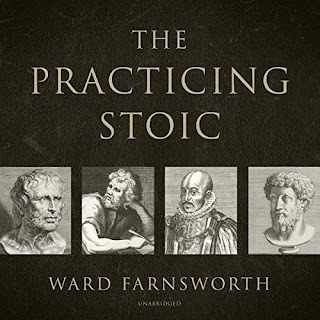
I'm happy to say that my brain did not implode. And I loved Farnsworth's accessible style. I wouldn't exactly call this one Philosophy for Dummies 101, but then again, Stoicism, so far as I can figure it out from this book is concerned with matters that affect us every day – how to live a good life, coming to terms with grief, dealing with anger, and so on. Much of what is discussed has real-world, practical applications – which is why I think Stoicism really appeals to me.
It's not so much about being, well, unemotional and horribly stoic, but rather being able to step back from a situation, where necessary, and not allowing your emotions to ride roughshod over you. So, that's what I mostly got out of the book. Farnsworth doesn't do a deep dive with this book. That's not what it's for. But, rather, it's intended to bring together the basic thoughts of the great Stoics in one volume, which is especially useful for people like me who get intimidated pretty quickly by overly complex, abstract thinking.
If anything, I feel I have a better idea, and now have a better context for such thinkers as the likes of Seneca and my favourite Roman emperor Marcus Aurelius. Farnsworth's writing is wonderfully narrated by John Lescault, and I highly recommend this book to anyone who wants a good introduction to the topic. I certainly feel more confident now about plunging into the primary texts that this book draws from.
April 21, 2022
Stuarts' Field Guide to National Parks & Game Reserves - Namibia, Botswana, Zimbabwe, Zambia & Malawi by Chris Stuart, Mathilde Stuart
Not so long ago I was given the opportunity to get a peek at Stuarts' Field Guide to National Parks & Game Reserves of Namibia | Botswana | Zimbabwe | Zambia | Malawi, which I reviewed for FMR. This handy guide was written by Chris and Mathilde Stuart, who clearly have a great passion for our continent's wild places.
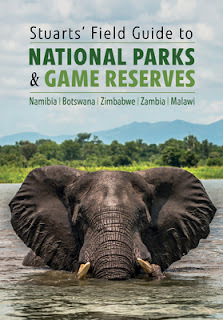
The guide is brimful of detailed maps and content that show how many wonderful parks and conservation areas these countries have, and will prove useful to anyone planning a trip. Many diverse, contrasting environments are to be found here, from coastlines to desert, and river deltas to savanna grasslands. Great pictures too, to give a teaser of what sorts of wildlife and vegetation you can expect. Many well-known areas such as Etosha, Chobe, Mana Pools, Victoria Falls, and more are featured.
This guide highlights the fact that conservation walks a tightrope between land usage – we must consider that people have been using natural resources for thousands of years – and also touches on how we need to mitigate the damage we cause now, with poaching being a very serious issue, as well as illegal timber harvesting, overgrazing and encroachment of human habitation – all these can have devastating, long-term effects on the environment. It's tricky to balance consumption with conservation – and these are challenges of land usage that will always need to be addressed.
The book is divided into two sections: one part dealing with the natural history, and the second providing an image gallery of some of the commonly occurring wildlife and vegetation – which is great for a quick identification. This latter part is divided into mammals, birds, reptiles, amphibians and trees. Handy sidebars in the first part of the guide offer tips and further commentary, and also warn if the reserve you wish to visit falls within a malaria or tsetse fly area or whether rabies might even be an issue. Warnings are also for the lack of cellphone reception in remote areas – connectivity often being something we city dwellers take for granted.
The wilds of Africa are offer a harsh, unforgiving landscape, yet one also filled with incredible, awe-inspiring beauty. Here be lions, quite literally – so if you wish to explore truly wild areas, it's best to be prepared and be aware of what's going on around you at all times. I found the natural history information particularly fascinating, and feel it will most certainly inform travellers, especially when it comes to selecting routes and deciding on which accommodation options will be suitable – whether you wish to tough it out or rather stay in a luxury tented camp.
The authors also give an indication of some of the plants and wildlife you'll most commonly see in particular areas. Equally important is information and advice about the road conditions, but also to take note when the dry or rainy seasons are, as these may also affect your mobility in whichever destination you visit. What I loved the best about this book is that it gives an introduction to parts of southern Africa that I don't know well, and I most certainly wish to visit before I shuffle off this mortal coil. With such a wealth of natural beauty, it's very tempting to forego overseas travel entirely and stay local – there's far too much to see and do in a single lifetime.
April 20, 2022
Aeterna by Kim Bannerman
I've become incredibly picky about which vampire novels I'll read these days, but staying with my current jam of post-apocalyptic treats, Aeterna by Kim Bannerman ticked all the boxes for me. The premise is simple: the vampire bloodlines have finally banded together to overthrow the human race. Their underground city of Aeterna has everything the vampires need, and humans are reduced to mindless blood-factors in the – ahem – same way the Machines treat humans in The Matrix. So I'm drawing that parallel, and I'll leave it there.
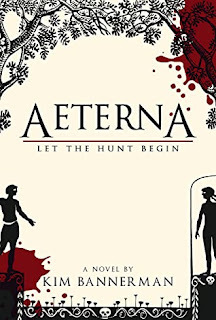
We follow the doings of Marcus, the scion of the ruling family, and the last vampire to be made before humanity's downfall, and then Bo, a human who has been genetically engineered for a special hunt event that will determine which vampire bloodline will rule the city for the next hundred years.
But both Marcus and Bo are special: Marcus cannot remember his mortal life at all, and his boundless curiosity sees him breaking the rigid protocols that bind vampiric society, while Bo is aware and is not some mindless, jelly-brained clone. She remembers what she shouldn't – how to string together words, how to think.
Aeterna has been built to last for ever, but in doing so, it has become trapped in stasis – a natural state for vampires that Marcus kicks against. I won't spoil to say how the hunt goes, but Marcus and Bo are thrown together by a twist of fate that sees the very foundations of this eternal tremble.
Overall, Bannerman's writing is solid, fast-paced and engaging, and I found myself immersed in the setting and more than happy to ride this one through to its cataclysmic end. My inner editor had a few nits to pick, but nothing to make me too twitchy. If you, like me, were ever a fan of the White Wolf Vampire: The Masquerade RPGs back in the late 1990s, then this one will more than likely push all the right buttons.
April 17, 2022
The Meek (Unbound Trilogy #1) by JD Palmer
I've been quite a long-time fan of post-apocalyptic fiction, and whether the human race goes bye-bye courtesy of aliens, zombies, nuclear war or rapture, the results are almost always the same for the survivors who desperately try to rebuild or cling to the vestiges of the world they once knew. In JD Palmer's The Meek, we meet Harlan, who's your average, garden-variety nice guy who somehow doesn't pop his clogs when a virulent virus wipes out 99 percent of the human race.
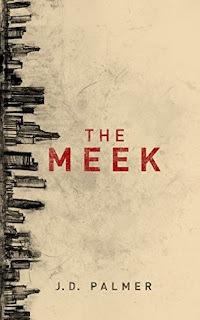
I've had this one in my TBR pile awhile now, and I had to go check the release date just to be sure, but book one did come out in 2017, so it was, ahem, almost oddly prescient about things to come. Granted, The Thing I Won't Mention By Name didn't quite go as far as the disease in Palmer's novel.
I'll start by saying that if exploring the darker side of human nature, and all that entails, isn't quite your jam, then this is possibly not *quite* the novel you're looking for – the start of the novel is quite triggering for those struggle to read stories where women are abused. So, insert trigger warning here – maybe step away if this freaks you out. I found Harlan quite a sympathetic character, even if he starts out quite passive. He goes through an almost literal hell, and watching him grow in himself to stand up against every obstacle that this new world of horrors can throw at him is rather satisfying.
Kudos also to the support cast. I really love the friendships that develop slowly as the pages turn. I'm not going to go into too much detail as I don't want to spoil. I'm also going to do the awful thing by drawing parallels between The Meek and the kind of social dynamics we encounter in series such as The Walking Dead, merely because it's going to be easier to paint the correspondence with broad brush strokes. Of course there are no zombies here, and the true monsters walk on two legs and look just like you and me.
While on the outside, this is a pure survivalist fantasy, set in a post-pandemic wasteland, I feel that Palmer does dig into the essential humanness of his characters, which is why I kept reading and why I'll eventually go onto book two once I have the opportunity. This is a story about the connections forged within states of great adversity, to move beyond the savagery that lies just beneath the skin, that often needs very little excuse to come out. What would you do if you had a chance to rebuild human society? How do you overcome the power play of those who do not suffer pangs of conscience?
I'll admit freely that I'm a huge sucker for stories that are based on a 'hard reboot' of civilisation, and Palmer delivers this sort of setting in spadefuls, and then some.
April 16, 2022
Diep Spoor deur Jeanette Stals
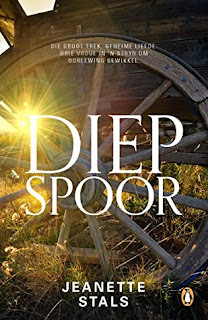
Diep Spoor is op die oog af die verhaal van drie vrouens wie deur omstandighede buite hulle kontrole bymekaar kom. Katrien is oorspronklik gelukkig getroud met haar man Gerrit op Stellenbosch, maar 'n ongeluk sien haar vroeg 'n weduwee. Maar haar getroue slavin Dina staan haar by. Die twee het saam grootgeword op Katrien se ouers se plaas, en is meer susters as eienaar en slaaf. Altwee is dromers. As her lewe anders was, so Katrien graag 'n kunstenaar wees, maar haar kosbare waterwerfkussie word meestal ver weg gepak. Dina droom van 'n lewe waar daar romantiese liefde vir haar is, maar haar opsies as 'n slavin is maar skraal op die werf. Heel aan die ander kant van die land is Thabisa, 'n amaZulu meisie wie van jonk af meegesleur word deur die geweld tussen haar mense. Sy verloor omtrent haar hele familie behalwe haar broer. Sy is kwesbaar, en die hele tyd sukkel sy om aanvaar te word.
Ek gaan nou nie die hele storie verspil nie, behalwe om te sê dat Stals het 'n uitdagende verhaal aangepak wat goed illustreer who ingewikkeld ons land se geskiedenis is. Konsepte van grondbesit was toe heel anders, en die botsing tussen bevolkingsgroepe wat met veeboerdery doenig is, is maar 'n resep vir groot ramp. Wat Stals goed doen is om die menslikheid van haar karakters voor te bring, sodat lesers meegevoel kan hê vir Katrien, Dina, en Thabisa.
Ek het gevoel dat Thabisa se storie 'n bietjie lig om die broek was, asook Dina s'n, en daar was tye terwyl ek gelees het dat ek gevoel het dat daar beter motivering kon wees vir hulle gedrag. Maar dit het nie van die storie te veel weggeneem nie. Al het ek min of meer geweet wat gaan gebeur daar anderkant die Drakensberg. Hierdie verhaal is soms verskriklik hartverskeurend maar hy bring ook hoop vir die algemene menslikheid wat kan groei tussen die wat van verskillende agtergronde onstaan.
March 23, 2022
A Short History of Humanity – How Migration Made Us Who We Are by Johannes Krause and Thomas Trappe
I'm a sucker for history, especially human prehistory, since there's still so much to be learnt about our past – most of which has been dug out of all manner of locations all over the world. But a science that is fairly new, and is delivering some truly fascinating insights into our social, physiological, and even geological history is that of archaeogenetics. The two authors of A Short History of Humanity – How Migration Made Us Who We Are, Johannes Krause and Thomas Trappe, are both experts in their field, and this little book packs a lot of punch in only 272 pages.
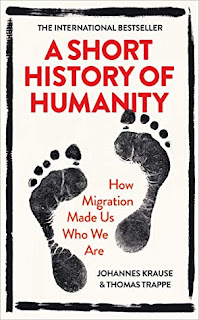
You might be forgiven if you worry that A Short History of Humanity will be above the average reader's pay grade, but this is so not the case. This work has been wonderfully translated into English by Caroline Waight, and is accessible even to readers who have little prior experience on the subjects that are covered.
Who would have thought that the analysis of a small pile of bone dust would lead to the mapping of not only the Neanderthal but the Denisovan genome – there you have it. Not only have the authors untangled the complex web of our relationships with our extinct cousins, but through their work, and others', they've created a timeline that illustrates the gradual expansion of Homo sapiens across Africa, Asia, and Europe, while exploring a complex interrelationship between the different populations of hunter-gatherers and early agriculturalists. The work these archaeogeneticists have done also challenges such tricky subjects such as race and species. How different were our ancestors truly from the Neanderthals if we could interbreed with them and produce fertile offspring? What of those whose heritage mingled the Neanderthal and Denisovan lines?
Yet a history of humanity is incomplete if we don't discuss the looming spectre that follows in our wake – that of the diseases caused by pathogens. The Black Death has stalked among our communities for centuries, and the scientists have uncovered evidence that shows how pandemics played a huge role in human migration, too. A glance at how society has changed in the face of the Covid-19 pandemic is yet another example of how we are shaped by pathogens and how we, as a species, are engaged in a constant arms race with our microscopic nemeses.
What it all boils down to, is that our preconceived notions of race and culture are, to a large extent, social constructs – and we would do well to look past all this to the fact that we share an amazing kinship that stretches through the millennia. Whether we are refugees or travellers, we as a species are not static, and we would do well to remember this and think in terms of a global community, and perhaps one day if we venture forth into the galaxy.



